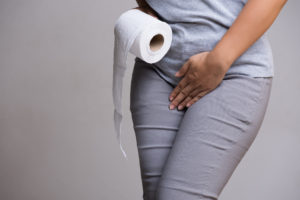
But why does it happen?
It can have different causes in women and men. In men, the primary cause is BPH, or benign prostate hyperplasia.
Women, on the other hand, experience bladder control troubles for several reasons. These include certain health problems or major life events that can weaken muscles on their pelvic floor. Some examples include:
- Pregnancy/childbirth
- Trauma or injury
- Cystocele and pelvic organ prolapse
- Menopause
These conditions can lead to stress incontinence, which means urine is discharged during certain movements that put stress on your bladder. Coughing, sneezing, laughing, or exercise can all cause stress incontinence.
But it can be treated naturally. One of the most common ways is Kegel exercises to strengthen pelvic floor muscles. These exercises involve tightening the muscles, holding the contraction, then releasing. Doing them daily can build strength to offer more bladder control.
Bladder training is another way to control urinary incontinence. It involves monitoring and controlling how often you use the bathroom. Start by logging trips, how you feel between them, and what generally happens before a leak.
Sharing this information with your doctor can help them create a schedule that helps to build bladder strength and improve bladder control.
A leaky bladder from stress incontinence does not have to be a chronic condition. There are ways to strengthen muscles to keep urine inside and give you more control over your life.